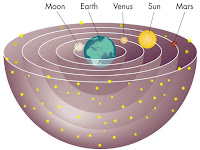Last week I posted on discussion board about the empiricist/intuitionist conflict being very similar to the democrat/republican of politics. I was thinking further on the subject and I realized that most of the conflicts throughout history stem from some sort of heart versus head debate. One of the classic examples is that of science and religion. Before the scientific revolution, it was the literature of Religion that held the most power. Specifically the Catholic Church was the lording entity.
Science has always been perceived as a threat by religion and vice versa. Similar to the Intuitionists, religion is based on what is unseen, on feeling. In the Intuitionist the world has progressed to the point that Empiricists and Intuitionists have reached a sort of equilibrium, one does not possess more power than the other. I think it would be interesting to see the outcome if one were to dominate because I have a feeling it would be very similar to the age when the Catholic Church dominated.
 |
| Vs. |
 The popular belief at that time was the concept of the geocentric model or the fact that everything in the universe revolves around the Earth. This was supported by philosophers and religious literature of the day. Galileo Galilei apposed this theory and through his research was able to propose and provide sound evidence for the theory that the sun was the center of the universe. If he were in the novel, I think that Galileo would have been an Empiricist. As is known from history, Galileo was condemned for his theory and eventually sentenced to live out his life under house arrest. What is it about these two ideas, thinking/feeling, knowing/believing that makes them such mortal enemies?
The popular belief at that time was the concept of the geocentric model or the fact that everything in the universe revolves around the Earth. This was supported by philosophers and religious literature of the day. Galileo Galilei apposed this theory and through his research was able to propose and provide sound evidence for the theory that the sun was the center of the universe. If he were in the novel, I think that Galileo would have been an Empiricist. As is known from history, Galileo was condemned for his theory and eventually sentenced to live out his life under house arrest. What is it about these two ideas, thinking/feeling, knowing/believing that makes them such mortal enemies? I think the true irony is that these concepts are really not that different yet we continually try to emphasize the line between them. Had the Catholic Church been open to what Galileo had to say religion may have discovered much earlier that Galileo’s theory was not the threat that they assumed it to be and progress would have happened sooner. Literature is open to interpretation, that is the true beauty of it, and just because an interpretation is different does not make it wrong and I think that this concept is exactly what maintains religion to this day.
-Elizabeth
-Elizabeth
Great topic. I like the idea of comparing that struggle to the philosophical one in the book. Maybe if we apply the change the other way and follow St. Thomas Aquinas's idea that reason and revelation not only can, but must, coincide without conflict, we can turn the real battle into the balance that the Empiricists and Institutionist have in the novel.
ReplyDelete- Japheth
Also, both fail in part due to polarizing thinking. We're either the center of the universe or you're a godless heathen, you devil you! (or something like that)....empirists or intuitionists....never the twixt shall meet.
ReplyDelete